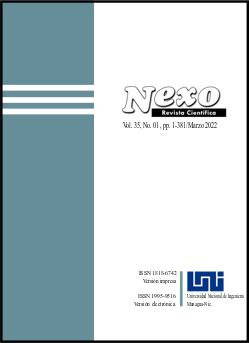Model of international scientific and technical cooperation in the context of globalization and development of territories
DOI:
https://doi.org/10.5377/nexo.v35i01.13941Keywords:
Complex Arctic study, international collaboration, legal model, scientific and technical collaborationAbstract
Currently a great number of problems have accumulated regarding the Arctic agenda in international legal, military, socio-economic, environmental, and scientific spheres. The authors of the study believe that international collaboration in the scientific and technical sphere, built upon a legal basis, is the first direction of mutually beneficial interstate collaboration in the Arctic region. The development of international scientific and technical collaboration in the field of complex Arctic study presupposes a comprehensive approach with regard to economic, legal and political aspects, and analyzing static and dynamic indicators. Thus, it is necessary to develop a legal model of collaboration. The development of the legal model of international scientific and technical collaboration in the field of complex Arctic study involves a range of actions aimed at improving the regulatory and conceptual framework, changing the system of state management of scientific and technical collaboration in the Arctic zone in order to ensure a consistent policy and eliminate existing problems.
Downloads
2175
Downloads
Published
How to Cite
Issue
Section
License
Copyright (c) 2022 Universidad Nacional de Ingeniería

This work is licensed under a Creative Commons Attribution 4.0 International License.
The authors who publish in Nexo Scientific Journal agree to the following terms:
- Authors retain the copyright and grant the journal the right of the first publication under the license Creative Commons Attribution License, which allows others to share the work with a recognition of the authorship of the work and the initial publication in Nexo Scientific Journal.
- Authors may separately establish additional agreements for the non-exclusive distribution of the version of the work published in the journal (for example, in an institutional repository or a book), with the recognition of the initial publication in Nexo Scientific Journal.
- Authors are allowed and encouraged to disseminate their works electronically (for example, in institutional repositories or in their own website) before and during the submission process, as it can lead to productive exchanges, as well as earlier and greater citation of published works.










